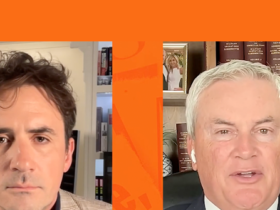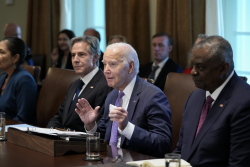Freshman Rep. Riley Moore (R-WV) on Friday introduced legislation that would allow the president to impose tariffs on any country.
The bill, the Reciprocal Trade Act, is a measure that President Donald Trump campaigned on and would massively extend his power over trade policy. Trump has vowed sweeping tariffs and can do much of that unilaterally, but reciprocal tariffs would require Congress’s stamp of approval.
Moore, who won election to Congress in November and was previously West Virginia’s state treasurer, told the Washington Examiner hours after his victory on election night that he intended to take a lead on introducing the Reciprocal Trade Act after he enters office.
“President Trump was the first national politician in my lifetime to recognize this problem, campaign on it, and work to reverse that trend,” Moore said. “With the U.S. Reciprocal Trade Act, we’ll give the Executive the leverage necessary to go to bat for the American people and achieve tariff reductions on U.S. goods.”
The Reciprocal Trade Act would allow the president to unilaterally impose tariffs of equal size of any tariffs placed by other countries on the United States. So, if one country has a 10% tariff on the U.S., Trump could match that and apply a 10% tariff against that country so the two are at parity.
In addition to Trump pushing for the Reciprocal Trade Act on the campaign trail, the new Republican platform was updated this past year to include language endorsing it.
“Our Trade deficit in goods has grown to over $1 Trillion Dollars a year,” the new platform reads. “Republicans will support baseline Tariffs on Foreign-made goods, pass the Trump Reciprocal Trade Act, and respond to unfair Trading practices. As Tariffs on Foreign Producers go up, Taxes on American Workers, Families, and Businesses can come down.”
While protectionists and Trump allies have praised the idea of reciprocal tariffs, some trade experts criticize the concept as unwieldy. Bill Reinsch, an expert in trade policy with the Center for Strategic and International Studies who served for 15 years as president of the National Foreign Trade Council, is one such critic.
Last year, Reinsch told the Washington Examiner such a thing would be a “nightmare” to administer because U.S. Customs and Border Protection would have to spend a huge amount of time and paperwork to determine the origin of an import. It would also turn U.S. tariff authority over to other countries instead of asking what tariff level is in the best interest of the U.S. to pursue, he said.
CLICK HERE TO READ MORE FROM THE WASHINGTON EXAMINER
Despite threatening to impose tariffs right out of the gate, Trump didn’t institute new tariffs on his first day in office. His first action on the trade front rather directed his administration to study trade policies and examine trade relationships with allies and adversaries alike.
Trump has a mix of ideological views on economic policy among his advisers, with some favoring a much more populist and protectionist trade stance while others seek a lighter touch on trade and tariff policy.
















Leave a Reply